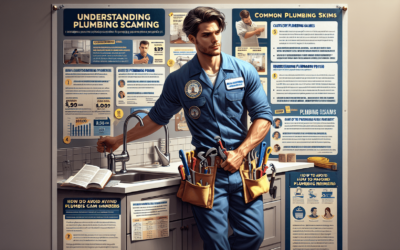Plumbing issues in homes are a common nuisance that can lead to significant inconvenience and financial strain.
Many plumbing problems, however, are preventable through routine maintenance and timely interventions.
This analysis explores the importance of preventive plumbing practices that every homeowner should adopt to ensure the longevity and efficiency of their home plumbing systems, thus avoiding costly repairs and emergency situations.
1. Understanding Your Home’s Plumbing System
A basic understanding of your plumbing system is essential for any homeowner.
A typical residential plumbing system includes supply lines that bring water into the home, drains that remove waste, and vents that allow air to enter the plumbing system to maintain proper drainage flow, and various water-using appliances and fixtures.
Supply lines are usually made of copper, PVC, or PEX, and need to be monitored for signs of corrosion or damage. Drains should be kept clear of obstructions to prevent backups, and vents must be free of blockages to ensure they function properly.
Familiarity with these components helps homeowners recognize early signs of plumbing issues, such as reduced water flow or gurgling sounds from drains.
2. Regular Inspections and Maintenance
Conducting regular inspections and maintaining your plumbing system are vital preventive measures.
Homeowners should periodically check their plumbing fixtures and appliances for any signs of wear or leaks. Key inspection tasks include:
- Examining faucets and showerheads for drips or leaks.
- Inspecting toilet tank components, such as flappers and fill valves, for wear and proper operation.
- Testing the water heater’s pressure relief valve to ensure it is functioning correctly.
It is also advisable to engage a professional plumber for an annual inspection, who can provide a more thorough check of the plumbing system, including assessing sewer lines and checking for hidden leaks.
3. Mitigating Risks with Early Interventions
Early intervention is crucial in preventing minor issues from escalating into major problems. Homeowners should be vigilant and responsive to early signs of plumbing failures. Practical steps include:
- Using strainers in sink drains to catch debris and prevent clogs.
- Ensuring only appropriate materials are flushed down toilets to avoid blockages.
- Regularly cleaning out vents and drain traps to maintain clear airways and water flow.
Additionally, installing water softeners can minimize mineral buildup in pipes, and insulating pipes can help prevent them from freezing and bursting in cold climates.
4. Implementing Water Conservation Techniques
Water conservation is an effective strategy for extending the longevity of plumbing systems by reducing stress and wear on pipes and fixtures.
Simple measures such as installing low-flow toilets and showerheads, repairing leaks immediately, and using dishwashers and washing machines with full loads can significantly decrease water usage and lower utility bills.
These practices not only save money but also contribute to environmental conservation.
5. The Financial and Practical Benefits of Preventive Plumbing
Adopting preventive plumbing practices offers substantial financial and practical benefits. Regular maintenance and early detection of potential issues can prevent costly repairs and extend the life of plumbing components.
This proactive approach also contributes to the overall efficiency of the plumbing system, ensuring that it operates at optimal conditions and conserves resources.
Effective preventive plumbing practices are essential for maintaining a healthy, efficient, and long-lasting home plumbing system.
By understanding the basic components of the system, conducting regular inspections and maintenance, addressing issues promptly, and implementing water conservation measures, homeowners can avoid the pitfalls of plumbing failures.
These practices not only save money in the long run but also provide peace of mind, knowing that the plumbing system is well cared for and less likely to cause unexpected disruptions.



0 Comments